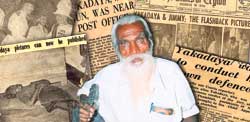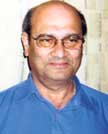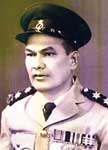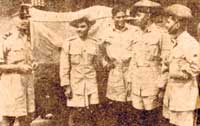
When heroism reigned over terror~ The paper clippings are faded, but the story is very much alive. Kumudini Hettiarachchi pieces together the hunt for Yakadaya, a ruthless killer in the ’50s through articles collected by the son of the police officer who overpowered Yakadaya in one of the biggest manhunts of yesteryear A paper trail into the past………leading back more than 50 years to a time unlike now, when even one brutal murder sent waves of shock and horror across the country. In an era sans television, newspapers were grabbed off the stands, with the public poring over every word, line and black and white photograph to glean every tiny detail. And the story coming alive off the yellowed newspaper clippings of yesteryear is none other than the heinous murder of a humble but diligent Postmaster in the wilds of Maradankadawela off Anuradhapura. The villain of the piece is, of course, ‘Yakadaya’, the Iron Man, who with robbery on his mind shot the Postmaster, as he attempted to telephone the police. Cold-blooded murder for a few hundred rupees.
The fading clippings have been filed and treasured by none other than Camillus I.B. Andrews, the son of W.H.B. Andrews, one of the police officers who overpowered the gun-wielding Yakadaya on a bus at Yasawatta, Matale.“My mum kept the paper cuttings and photographs of the incident and it was only after her passing away in December 2006 that they came to light, when we were sorting out her writing desk,” says Camillus who is living in England, in an e-mail interview with The Sunday Times. His mother had lived in Negombo until her death. Going down memory lane, to the time he was a mischievous six-year-old living with his family in Matale, he recalls the day when a police car, an Austin-40, arrived at their home. “My dad was at home with us and by the urgency of all the activity we realized something very serious was happening. My dad got into his uniform and left,” he says, adding that it was only the next day that they found out that the notorious Maradankadawela Yakadaya had been arrested by a team comprising ASP Jack Van Sanden, his father and a few others. That was July 19, 1955.“Yakadaya was held at the Matale Police Station. I did see Yakadaya in his cell when my dad escorted me to the station a day after the arrest. There were hundreds of people who had surrounded the police station hoping to get a sight of him,” says Camillus, who is into funeral directing in England. His father, Wilfred Hugh Bains Andrews, went on to become an Inspector and secure many medals and in his son’s words “retired in 1971 after a long and distinguished service in the Police Force. He did not have any further contact with Yakadaya during his imprisonment or after his release. Dad never discussed Yakadaya’s arrest with us at any great length”. Most probably, it was taken as part of his work by this duty-conscious officer who passed away in 1976. The clippings, however, indicate otherwise. This is what the Daily News in what seems like the lead story states: “The final chapter to the man-hunt came when the Rattota bus was stopped by one of the many police ambush parties at Yasawatta. Sergeant de Hoedt boarded it and Yakadaya who was crouching in the back seat levelled his shot gun at him.
“In a flash Sub-Inspector Andrews from the rear of the bus pinioned Yakadaya’s gun hand. Whipping out a six-chambered service Colt revolver which he had concealed in his trouser pocket, Yakadaya then fired twice over his shoulder and missed. He was quickly overpowered. “Meanwhile, his companion William had made his getaway, diving through a window of the bus into the scrub. He was arrested a few hours later. None of the police party was injured.” And the crime which set off the “biggest manhunt in Ceylon” pieced together later reveals that on the night of July 11, 1955, Yakadaya had with a crowbar forced open the front window of the tiny post office in Maradankadawela, and when the Postmaster, realizing that robbers were about attempted to phone the police, blasted him with a shot gun at close range. The “takings” of the night for Yakadaya were Rs. 364.24 in cash, savings certificates valued at Rs. 3842.50 and stamps valued at Rs. 831.26. Later, police found abandoned in the jungle in Kekirawa a bicycle, an empty stamp album, a large number of savings certificates, twine, pencils, nibs, keys and government envelopes. The clippings unfold a gripping drama of a reign of terror by Island Reconvicted Criminal (IRC) 881/47 Sanchi Aratchige Jinadasa alias Yakadaya who was not only wanted for the killing of the Maradankadawela Postmaster T. Thambiah but for many more crimes. Creating word pictures, the clippings follow Yakadaya and alleged accomplice Jimmy held in Matale soon after their capture, to Anuradhapura, giving details of the identification parade; the non-summary proceedings at the Anuradhapura Magistrate’s Court; the trial-by-jury at the Kurunegala Assizes where Yakadaya was charged on five counts, along with two others, of murder, robbery and housebreaking; his application to the Court of Criminal Appeal for leave to appeal and to defend himself; and the subsequent dismissal of his appeal. Interestingly, the jury deliberations, during this trial at the Kurunegala Assizes, take only 20 minutes on June 15, 1956, and a unanimous verdict of guilty was the result, after which Yakadaya was sentenced to death and also handed down 10 years’ rigorous imprisonment. M.M. William alias Jimmy and G.M. Kapuruhamy alias Enga were acquitted and discharged.
While in prison, the death sentence was commuted to 20 years’ rigorous imprisonment. However, after being in solitary confinement for seven years, and serving a few more years, Yakadaya was freed, 14 years after the Maradankadawela killing because the authorities were confident that “he was a changed man”. Yakadaya, born in Peradeniya in March 1921 had had a troubled childhood. His father a small trader had moved from Peradeniya to Manampitiya, close to Polonnaruwa, and set up business there. Yakadaya had studied only up to Grade 7. When his parents died while he was in his twenties, he had fallen into bad company, becoming addicted to gambling. Acquiring the name Yakadaya when he jumped off a bridge at 18, he had first been convicted of the Anuradhapura Bank robbery in the late ’40s. Notorious for jailbreaks and attempted jailbreaks and inciting prisoners against the jailors, he was finally put away after his conviction in the Maradankadawela murder case. This is what the clippings reveal of the climax of the saga of the arrest of Yakadaya. The pathetic figure cut by this IRC who sent terror into the hearts of the humble folk in Anuradhapura is amply demonstrated when a news item states: “Crowds at Matale who were afforded a glimpse of this ex-convict saw a thoroughly cowed man. He cut a pathetic figure in his black serge shorts and tattered woollen banian. Clapped in irons in his little cell at Matale Police Station, he sobbed every time he saw a uniform. However, many of the constables and police officers of the area who have had previous experience of Yakadaya state that his sobbing was just a bit of acting.” Two interviews with Yakadaya in The Sunday Times itself in March 1991 and the Lankadeepa just last year depict an old man with his signature beard who is heavily into Buddhism. Meanwhile, the only reward that the police officers who arrested Yakadaya were awarded was a handshake from the then Prime Minister Sir John Kotelawala and Governor-General Sir Oliver Goonetilleke at the Audience Hall in Kandy.
“Congratulating Mr. Jack Van Sanden, ASP, Matale, and his men, Sir John said, ‘I was most anxious to meet you and thank you on behalf of the country. Each one of you has risked your life. It is good to know that we can depend on men who are prepared to face the utmost danger in their devotion to duty. I do thank you’,” states another clipping. For the family of IP Andrews, the file of clippings with these words and stories of a heroic deed will be the legacy they will hand down to their children and grandchildren. |
|| Front
Page | News | Editorial | Columns | Sports | Plus | Financial
Times | International | Mirror | TV
Times | Funday
Times || |
| |
Reproduction of articles permitted when used without any alterations to contents and the source. |
© Copyright
2007 | Wijeya
Newspapers Ltd.Colombo. Sri Lanka. All Rights Reserved. |



